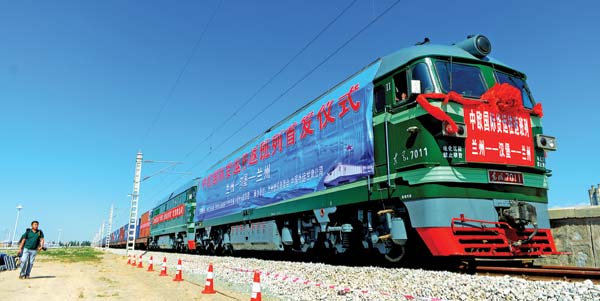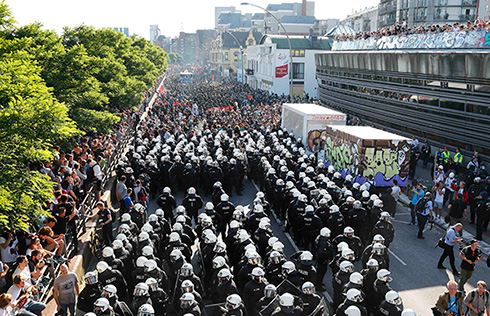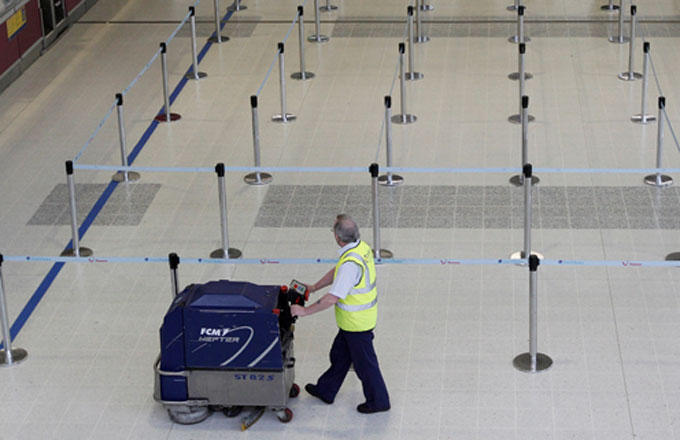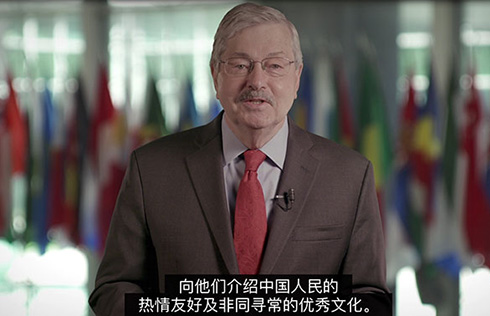Initiative opening the door to new ways to cooperate
 |
|
The first China-Europe freight train departs from Northwest China for Germany in August 2015. [Photo/For China Daily] |
With globalization under threat, Belt and Road concept is inspiring G20
With a surge of anti-globalization sentiment in some Western countries casting a shadow over Friday and Saturday's G20 summit in Hamburg, Germany, the China-proposed Belt and Road Initiative is inspiring the group of major economies with new ideas for cooperation.
President Xi Jinping will attend the summit following his state visit to Germany. He has called on the G20 to continue to champion globalization and innovative growth.
The anti-globalization sentiment has manifested itself in the United States' America First policy, Britain’s decision to leave the European Union, and the US withdrawal from the Paris climate accord.
Against such a backdrop, business leaders have been viewing the Belt and Road Initiative as an inspirational way for the G20 to boost mutually beneficial cooperation.
The world needs a "Plan B" against the anti-globalization sentiment, Tufan Khalaji, managing director of Austria’s Rail Cargo Operator, told Xinhua.
He said the Belt and Road Initiative offers the world a solution at the right moment.
The initiative, which was proposed by Xi in 2013, aims to build trade and infrastructure networks that will connect Asia with Europe and Africa, along the ancient Silk Road trade routes. The initiative is aimed at promoting common development and prosperity.
China is expected to continue its determined advocacy of free trade and globalization, within which the Belt and Road Initiative can play a major role, said Gu Xuewu, director of Bonn University’s Center for Global Studies.
While the US has injected "the biggest uncertainty" since 2008 into a G20 summit, Gu said China and Germany should work hand-in-hand to bring the world closer.
Gu is the first full professor in political sciences and international relations in Germany who is of Chinese origin.
Given the unwillingness of the US to support free trade and climate protection, the rest of the world has high hopes that China and Europe will take up a leading role in advocating globalization, Gu said.
He said Xi is likely to deliver a steadfast message of support for globalization alongside German Chancellor Angela Merkel, who will chair the summit in Hamburg.
"If President Xi expresses his continuous support of European integration and globalization in his speech, that will be an encouraging message for Europeans and the world," said Gu.
As far as Europe is concerned, the China-Europe freight train service promotes interconnectivity that not only facilitates the flow of commodities but also brings opportunities to improve railway infrastructure and the transport system in general to countries along the Eurasian railway routes.
The China-Europe freight train service, which was launched in March 2011, has seen a remarkable increase in transport volume.
Citing the experiences of German logistics company Deutsche Post DHL Group, Thomas Kowalski, DPDHL director of operations in multimodal transport, said the Belt and Road Initiative expands the freight volume of railway routes connecting China and Europe, which boosts DHL's business.
The freight volume of Eurasian railway lines has steadily risen since the opening of the China-Europe freight train service. It is estimated that the volume will exceed 1 million standard-sized containers by 2030, according to Kowalski.
Shan Jing, business development manager at Far East Land Bridge Ltd, said the China-Europe freight train service also facilitates the transport of goods between Europe and other Asian countries, such as Japan and South Korea.
The trans-continental trains operated by FELB currently depart mainly from the cities of Suzhou and Changsha in southern China. They leave through Northeast China, headed for European cities including Warsaw, Duisburg, Hamburg and Milan.
Germany's International Rail Freight Business Association supports the Belt and Road Initiative.
Its chairman, Olaf Krueger, said the initiative may provide opportunities for countries to modernize existing rail lines and create new transportation corridors.
In addition, the direct rail link between China and Western Europe offers a new option for shippers. Some European business leaders call it an "artery" because it injects fresh blood into the existing European rail freight networks.
With China’s promotion of the Belt and Road Initiative, Gu said China has already helped Africa better integrate globally and this will be an overlapping priority shared by both China and Germany.
"The Belt and Road Initiative, if successfully implemented, will be bringing globalization to a new level in geopolitical and economical perspective," said Gu. "It brings less-developed regions in Asia and Africa into the global system."
Geoffrey Harris, a teaching fellow in European integration and global human rights at Belgium’s Vesalius College, said his expectations for the G20 summit were not "very high", as long as the US plays a negative role.
"There are some crises on the ground for the Hamburg meeting and it will be very difficult," said Harris.
But he noted that, China and Europe should work together to try to ensure improvements are delivered.
"China has taken a positive approach in engaging globalization and everybody defines it as impressive to promote global cooperation," said Harris."We hope such a spirit of globalization can be seen in Hamburg as well."
Xinhua contributed to this story.


















